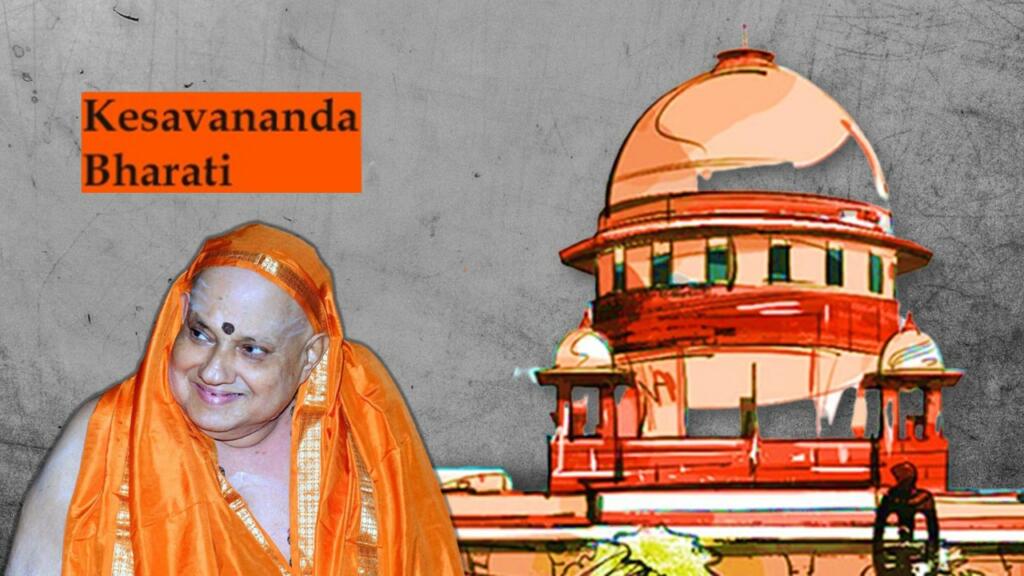Kesavananda Bharati vs State of Kerala Case: The erstwhile colonial state of British India highlighted the dire inevitability of achieving sovereignty, unity, and integrity amongst the citizens. The three fundamentals were therefore critical in speeding up the birth of “unity in diversity” nationalism in India and defending against the British “divide-and-rule” conspiracy.
Thus, moving into “Swaraj,” the founding fathers of the Constitution unequivocally advocated the incorporation of sovereign, democratic, republican, and federal characteristics in the Constitution. However, 75 years after Independence, the majority of the populace has forgotten the essence of these principles in attributing to them their day-to-day rights and liberties.
The Supreme Court, in the historic Kesavananda Bharati vs State of Kerala of 1973, proposed the basic structure doctrine. Thus, encapsulating the essentials of parliamentary democracy as part of the basic structure and beyond the amending powers of the legislature.
The Apex Court held that the power of the Parliament under Article 368 does not authorise the government to amend the basic structure of the Constitution. The judgement formed the bedrock for the power of judicial review over and above all laws passed by Parliament. Therefore, the court iterated that the prospective governments cannot mess with the sovereign orientation, democratic spirit, republican nature, and federal character of the nation.
Also read: The spineless “Juvenile Justice Act” needs an immediate upgrade
Sovereign orientation
The Bench, led by Chief Justice Sikri, illuminates that the nation is sovereign in its orientation and that no act of Parliament can take away India’s sovereignty. By attributing “sovereignty” as part of the basic structure, the court puts an embargo on the prospective governments. That is to say, the government cannot compromise on the independent status of India.
It means that India is a supreme power, and no internal group or external authority could undermine the authority of the Indian government. As a sovereign state, India is free from any kind or form of foreign interference in its domestic affairs.
Also read: The 1995 case that cemented the notion of ‘Hinduism is a way of life’ and why it is not right
Republic nature of Government
The Supreme Court was of the view that the republic form of government is an essential aspect of the spirit of our Constitution. Therefore, no act of Parliament can enforce a change in the Republican nature of India. That is to signify that in India there exists an elected head of state, i.e., the President, and it cannot be amended under Article 368.
Democratic spirit of the nation
The Hon’ble Bench of the Supreme Court preserved the democratic spirit of the nation by providing it protection under the Doctrine of Basic Structure. That is to say, the legislature cannot change the form of government or take away people’s rights to participate in a parliamentary democratic process.
The judgement has played a significant role in withholding liberal democratic values, especially during the period of “Emergency” (1975–1977). The period can be said to be a sole deviation from the democratic path, owing to Prime Minister Indira Gandhi’s paranoia. With this and several other notable exceptions, the rule of law has done better in India than in most other nations, and much of the credit goes to the noble monk Kesavanand Bharathi.
Also read: Understanding Indra Sawhney Case: The post-Mandal “reservation criteria has glaring loopholes in it”
Federal character of government
The Supreme Court also pointed out that the legislature cannot use its discretion and powers under Article 368 to change the federal character of the governance. That is to say, “federalism” is a part of the basic structure, and the legislature cannot interfere with the institutional mechanism to accommodate two sets of politics, one at the centre or national level and the second at the regional or provincial level.
Consequently, the prognosis of the Judiciary in this landmark case can be said to uplift the “citizens’ ardent spirit of patriotism” and blossom the “democratic, republican, and sovereign” spirit of India away from political arbitrariness.
Support TFI:
Support us to strengthen the ‘Right’ ideology of cultural nationalism by purchasing the best quality garments from TFI-STORE.COM
Also Watch:
https://www.youtube.com/watch?v=XYhjd7yJJP4
